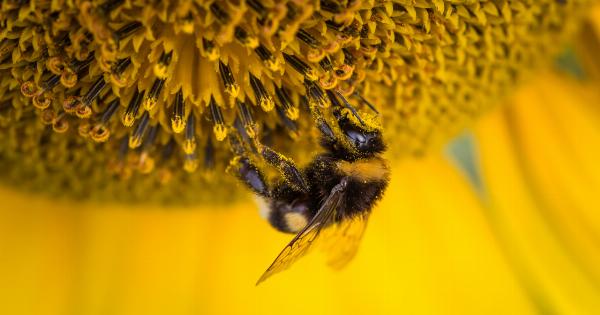Eating fruits and vegetables is essential for a healthy diet, but some of them may pose a risk to your health without you even realizing it. Here are 30 fruits and vegetables that may be poisoning you without you knowing – lets explore why!.
1. Apples
Apples are one of the most popular fruits in the world. However, despite their many benefits, it’s important to know that most apples contain trace amounts of cyanide in their seeds and skin.
While small amounts of cyanide aren’t harmful to humans, eating too many apple seeds or consuming high amounts of apple juice could be.
2. Bananas
Bananas are known for their high potassium content, but they’re also a source of harmful chemicals.
Some bananas are contaminated with pesticides, which can lead to adverse effects like headaches, nausea, and eye irritation when ingested frequently. It’s best to opt for organic bananas to avoid any potential health risks.
3. Blueberries
Blueberries are known for their antioxidant properties, but they can also be potentially harmful. Blueberries that have a moldy or fermented taste could contain mycotoxins, which can lead to stomach cramps, bloating, and vomiting.
Always check your blueberries before consuming and ensure they do not have any visible mold or unusual smells.
4. Broccoli
Broccoli is a go-to vegetable for many healthy diets. However, it’s important to know that broccoli contains goitrogens, which can interfere with the thyroid gland’s function if consumed in large quantities.
While eating moderate amounts of broccoli is safe, consuming it in excess amounts could lead to thyroid issues.
5. Cabbage
Cabbage is a staple in many dishes worldwide, but it’s important to keep an eye on how you eat it. Raw cabbage contains a compound called progoitrin, which can interfere with thyroid gland function.
Eating moderate amounts of cooked cabbage is safe, but consuming raw cabbage often in large quantities can lead to thyroid issues over time.
6. Carrots
Carrots are a rich source of vitamins and minerals, but they can also be a source of harmful chemicals. Some carrots have been found to contain pesticides, which can have several negative effects on your health.
To avoid potential health risks from consuming pesticide-contaminated carrots, look for organic options and soak them thoroughly in water before eating or cooking them.
7. Celery
Celery is often added to salads, stir-fries, and soups for its unique flavor and crunchy texture. However, it’s important to know that celery contains psoralens, a compound that can make your skin sensitive to sunlight.
This can cause sunburns or blisters if you’re exposed to the sun’s rays for an extended period.
8. Cherries
Cherries are known for their sweet taste and nutritional benefits. However, some cherries may be contaminated with pesticides that can cause several health issues, including nausea, headaches, and stomach cramps.
It’s best to look for organic cherries, and wash them thoroughly to avoid any potential health risks.
9. Cucumbers
Cucumbers are a refreshing and hydrating food. Still, it’s vital to know that some cucumbers are sprayed with pesticides and fungicides that can harm humans’ health.
To avoid any potential health risks, it’s best to look for organic cucumbers and wash them thoroughly before cooking or eating.
10. Grapes
Grapes are a healthy snack that’s low in calories. However, some grapes may be contaminated with pesticides, which can cause several health issues like nausea, headaches, and stomach cramps.
It’s essential to wash grapes thoroughly and to opt for organic options to avoid any potential health risks.
11. Kiwis
Kiwis are packed with nutrients and are a common ingredient in smoothies and fruit bowls. However, kiwis can also be contaminated with pesticides that can harm your health.
It’s best to opt for organic kiwis to avoid any potential health risks and wash them thoroughly before consuming.
12. Lettuce
Lettuce is a common salad ingredient and a popular leafy green that can also be a source of harmful chemicals. Some lettuce is sprayed with pesticides and fungicides that can be harmful to humans.
To avoid any potential health risks, always choose organic lettuce and wash it thoroughly before eating or cooking.
13. Mushrooms
Mushrooms are a popular ingredient in many dishes worldwide, but they’re also a source of harmful toxins. Some wild mushrooms contain toxic chemicals that can lead to severe health issues like liver failure and death.
It’s crucial to know what type of mushroom you’re consuming and to opt for commercially produced mushrooms to avoid any potential health risks.
14. Onions
Onions are used in several recipes worldwide for their flavor and health benefits. However, some onions are sprayed with pesticides that can be harmful to humans.
To avoid any potential health risks, it’s best to choose organic onions and to wash them thoroughly before cooking or consuming them raw.
15. Oranges
Oranges are a popular citrus fruit that’s consumed worldwide for its vitamin C content and nutritional benefits.
However, oranges may contain a compound called imazalil, which is a fungicide that can harm humans’ health if consumed in large quantities. It’s essential to wash oranges thoroughly before consuming to avoid any potential health risks.
16. Peaches
Peaches are a nutritious fruit that’s often consumed fresh or in jams and jellies. However, some peaches may be contaminated with pesticides, which can cause several health issues like nausea, headaches, and stomach cramps.
It’s best to opt for organic peaches and to wash them thoroughly to avoid any potential health risks.
17. Peppers
Peppers are a staple in many dishes worldwide and are known for their distinct flavor and health benefits. However, some peppers may be contaminated with pesticides that can be harmful to humans.
To avoid any potential health risks, it’s best to opt for organic peppers and to wash them thoroughly before cooking or eating raw.
18. Pineapple
Pineapple is a tropical fruit that’s often consumed fresh or in smoothies and fruit salads. However, some pineapples may be treated with harmful pesticides that can cause several health issues.
It’s best to opt for organic pineapples and to wash them thoroughly before consuming to avoid any potential health risks.
19. Raspberries
Raspberries are a sweet and nutritious fruit that’s often consumed fresh or in jams and jellies. However, some raspberries may be contaminated with harmful pesticides that can cause several health issues like nausea, headaches, and stomach cramps.
It’s important to opt for organic raspberries and wash them thoroughly before consuming to avoid any potential health risks.
20. Spinach
Spinach is a popular leafy green that’s packed with vitamins and nutrients.
However, it’s important to know that spinach contains oxalates, which can interfere with the body’s absorption of calcium and can cause kidney stones if consumed in large amounts. Eating moderate amounts of spinach is safe, but consuming it in excess amounts could lead to kidney issues.
21. Squash
Squash is an essential ingredient in many dishes worldwide and is known for its nutritional benefits. However, some squash may be sprayed with pesticides that can be harmful to humans.
To avoid any potential health risks, it’s best to opt for organic squash and to wash it thoroughly before cooking or eating raw.
22. Strawberries
Strawberries are a sweet and refreshing fruit that’s consumed worldwide. However, some strawberries may be contaminated with harmful pesticides that can cause several health issues like nausea, headaches, and stomach cramps.
It’s best to opt for organic strawberries and wash them thoroughly before consuming to reduce any potential health risks.
23. Sweet potatoes
Sweet potatoes are a delicious root vegetable that’s consumed worldwide. However, some sweet potatoes may be treated with harmful pesticides that can cause several health issues.
It’s best to opt for organic sweet potatoes and wash them thoroughly before cooking or consuming raw to avoid any potential health risks.
24. Tomatoes
Tomatoes are a staple ingredient in many recipes worldwide and are known for their nutritional benefits. However, some tomatoes may be sprayed with pesticides that can be harmful to humans.
To reduce any potential health risks, it’s best to opt for organic tomatoes and wash them thoroughly before cooking or consuming raw.
25. Watermelon
Watermelon is a refreshing and hydrating fruit that’s consumed worldwide. However, some watermelons may be sprayed with harmful pesticides that can cause several health issues.
To avoid any potential health risks, it’s best to opt for organic watermelon and to wash it thoroughly before consuming.
26. Zucchini
Zucchini is a versatile vegetable that’s consumed worldwide. However, some zucchini may be sprayed with pesticides that can be harmful to humans.
To reduce any potential health risks, it’s best to opt for organic zucchini and wash it thoroughly before cooking or eating raw.
27. Grapefruit
Grapefruit is a citrus fruit that’s consumed worldwide for its nutritional benefits. However, grapefruits could interact with some medications and lead to harmful side effects.
If you’re taking medication, it’s best to check with your doctor before consuming grapefruits to avoid any potential health risks.
28. Potatoes
Potatoes are a staple food that’s consumed worldwide. However, potatoes contain solanine, a toxic substance that can lead to several adverse effects like nausea, headaches, and stomach cramps if consumed in large amounts.
It’s best to wash potatoes thoroughly before cooking and avoid eating any green potatoes or potato sprouts to reduce any potential health risks.
29. Rhubarb
Rhubarb is a popular ingredient in many desserts worldwide. However, rhubarb leaves contain high amounts of oxalic acid, which can interfere with calcium absorption and lead to kidney stones if consumed in large amounts.
It’s best to avoid eating rhubarb leaves altogether to reduce any potential health risks.
30. Cilantro
Cilantro is a herb that’s often added to dishes for its unique flavor. However, some people may be allergic to cilantro, which can cause several adverse effects like hives, rash, and breathing difficulties.
If you notice any symptoms after consuming cilantro, it’s best to avoid it in the future to reduce any potential health risks.
Conclusion
Eating fruits and vegetables is essential for a healthy and balanced diet. However, it’s important to be aware of any potential health risks associated with consuming certain fruits and vegetables.
By opting for organic options, washing produce thoroughly before cooking or consuming, and being aware of any allergies or medication interactions, you can lower the risk of ingesting harmful chemicals or toxins.


























